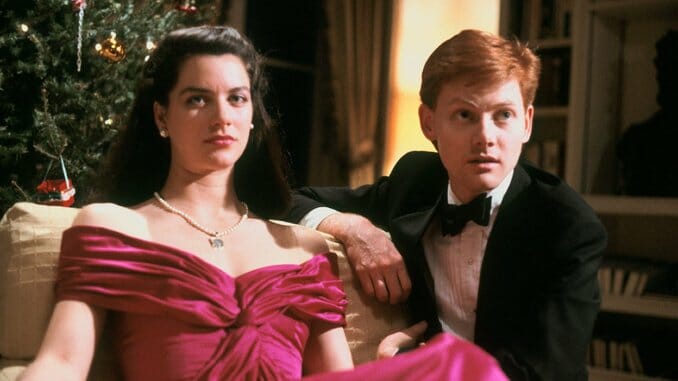The holidays are often the best time of year to watch Whit Stillman films. Every December, the Downtown Manhattan theater Metrograph would screen a holiday double feature with the director introducing Metropolitan and Last Days of Disco. This year, Metropolitan, Stillman’s satire of the New York City debutante scene—his fantasy of the upper middle class, waxing poetic on the empty conversations in Upper East Side luxury apartments—turns 30 years old. The film takes place during winter break, the chaotic month between semesters which presents a “no man’s land” of social life. Classmates return home, sometimes alone. Others may stay in the city, also alone. The period between Christmas and New Year’s transforms New York City into a shell of itself. In 2020, life in isolation and quarantine can feel like an eternal winter break.
The malaise of winter holidays summons everyone indoors. With absolutely nothing to do and no one around, the street lights blink for no one. We contemplate our fall semester’s flings hoping to validate our feelings in the spring. Whose relationships will survive the tailend of winter? The comfort of being at your best or dozing off in the presence of acquaintances is what makes Whit Stillman’s film so luscious and endearing—now, perhaps, even enviable. They’re just teenagers traipsing around uptown, and like most lost souls of a certain class, they end up in the stone-lined driveways of Long Island.
But it all started with Tom Townsend (Edward Clements), a redheaded Princeton student from the Upper West Side, hitching a ride quite literally into the world of the Upper East Side’s debutante season. Tom claims to be different. He calls himself a socialist. Despite looking down upon debutante parties, he can’t help but find himself in a budding relationship as an escort to Audrey Rouget (Carolyn Farina). While the film’s ensemble portrays the WASPy “bright young things” with the kind of aimless youth of the time, Stillman’s touch is in its finely-tuned characters. The “Sally Fowler Rat Pack,” as the group have dubbed themselves, worry about losing their fortunate status and contemplate if they are doomed to failure.
Thirty years after Metropolitan’s premiere in 1990, Brooks Brothers filed for bankruptcy —but the idea of the self-proclaimed “Urban Haute Bourgeoisie,” or UHB, as Nick Smith (Chris Eigeman), another member of the set, calls it, hasn’t seen its doom just yet. We can always hope it’s coming soon. With cashmere sweaters and swooped hair, the characters declare their witty thoughts (that can only be had at nighttime, paired with the comfort of hot tea or a cigarette) aloud. They hold a healthy disregard for the class of people who take the crosstown bus to the godforsaken Upper West Side. Thirty years later, the UWS has seen a class transformation of its own, becoming a neighborhood that has protested a vacant hotel sheltering the unhoused during the pandemic. The crowded and gentrified streets that were once considered “sleazy” have since embraced the occasional high-rise luxury development and liberal NIMBYism. Like its counterpart, the Upper West Side would be an affluent cultural hub of its own, thirty years later.
If Audrey were to look for a book about Fourier at Scribner’s Bookstore today, she would instead find herself at a Lululemon. While there are exceptions for spaces of generational wealth, like Cartier or Sally’s apartment, the kind of New York where people gather in living rooms to commiserate is timeless. For an ambiguous “period piece” of the city, the adolescent characters are fundamentally uncool. They impress themselves with references to Fourier, Lionel Trilling, and Averell Harriman, New York’s governor in the 1950s. If they had enough character to get over themselves and take a subway ride below 14th Street, they might discover a doomed class, but with enough self-awareness to joke about it.
Yet, the choreography of its characters inevitably creates a portrait of the city. They fluctuate between Park Avenue and Midtown with the lovely backdrop of The Plaza Hotel and The Met at Christmas time. With this ensembled geography, Metropolitan falls in the vein of quintessential hangout movies, finding companions not only in its ‘90s contemporaries like Noah Baumbach’s Kicking and Screaming, but to Preston Sturges’ screwball upper-crust farces. As the characters circulate each other’s apartments through debutante season, the young socialites of the Upper East Side make me long for the tepid conversations and article recommendations traded with people I see once a year. The unrelenting “winter break” that is 2020 can feel like scene after scene of sitting in living rooms making slight observations to no one.
This complicated desire is encapsulated in a brief scene where the group is sitting around in a parlor room after one of their parties. The arrogant yet likable Nick is looking out the window in an attempt at self-reflection. He delivers a deadpan line with callow seriousness: “There are 8 million stories out there.” It’s a useless observation, but one that can only happen in the company of friends who appreciate the candor of afterparties. Metropolitan shows this class of people looking to protect their social position, sure, but also attempting to make contact beyond their crowd. Revisiting the film thirty years after its release gives perspective without any trite nostalgia—and, more importantly, in a year when we can’t lounge on friends’ shoulders post-holiday meal, the gossip in the powder room and private asides in the kitchen now seem like retro old world glamour.
Jessica Jacolbe is a writer from Brooklyn whose work appears in VICE, JSTOR Daily, and Catapult. She is a graduate of Columbia Journalism School where she concentrated on Arts & Culture writing. You can find more of her work on her website and Twitter.
